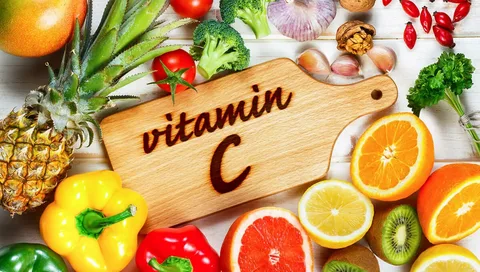Vitamin C, also known as ascorbic acid, is a water-soluble vitamin that plays a crucial role in various bodily functions, including wound healing. This guide explores how Vitamin C supports the healing process and its importance in maintaining healthy skin and tissue.
What is Vitamin C?
What is Vitamin C and why is it essential for the body?
Vitamin C is a potent antioxidant that supports various physiological functions, including collagen synthesis, immune function, and wound healing. It helps protect cells from oxidative stress and aids in the absorption of iron from plant-based foods.
How Does Vitamin C Support Wound Healing?
How does Vitamin C contribute to the wound healing process?
Vitamin C is vital for collagen production, a protein that provides structure to the skin, tendons, and ligaments. Collagen is essential for wound repair as it helps form scar tissue and promotes the closure of wounds. Additionally, Vitamin C strengthens the immune system, which is crucial for fighting infections that can delay healing.
Sources of Vitamin C
What are the best food sources of Vitamin C?
Citrus fruits (like oranges and lemons), strawberries, kiwi, bell peppers (especially red and yellow), broccoli, and spinach are excellent sources of Vitamin C. Supplements are also available for those who may not get enough from their diet alone.
Benefits of Vitamin C for Wound Healing
Enhanced Collagen Synthesis
How does Vitamin C help in collagen synthesis?
Vitamin C is necessary for the hydroxylation of proline and lysine, which are amino acids essential for collagen formation. This process is critical for the structural integrity of skin and tissues during wound healing.
Antioxidant Protection
Why is antioxidant protection important for wound healing?
Antioxidants like Vitamin C help neutralize free radicals, which are harmful molecules produced during inflammation and tissue injury. By reducing oxidative stress, Vitamin C supports a favorable environment for healing.
Improved Immune Function
How does Vitamin C strengthen the immune system during wound healing?
Vitamin C enhances the function of immune cells, such as neutrophils and macrophages, which play a crucial role in combating infections at the wound site. This immune support speeds up the healing process and reduces the risk of complications.
Practical Applications and Considerations
Using Vitamin C Supplements
Are Vitamin C supplements necessary for wound healing?
In cases where dietary intake is insufficient or during periods of increased need (such as recovery from surgery), Vitamin C supplements can be beneficial. It’s essential to consult a healthcare provider for personalized advice on dosage and supplementation.
Topical Vitamin C for Wound Care
Can topical Vitamin C formulations help with wound healing?
Topical Vitamin C may aid in wound healing by promoting collagen synthesis directly at the site of injury. However, its efficacy can vary depending on the formulation and concentration used.
FAQs About Vitamin C and Wound Healing
How much Vitamin C do I need for optimal wound healing?
The recommended daily intake of Vitamin C for adults is 75 mg for women and 90 mg for men. Higher doses may be necessary during illness or recovery.
Can Vitamin C prevent infections in wounds?
Vitamin C supports immune function, which may reduce the risk of infections in wounds. However, proper wound care practices are also essential for prevention.
Are there any side effects of taking Vitamin C supplements?
High doses of Vitamin C (over 2000 mg per day) may cause digestive upset, such as diarrhea or abdominal cramps. It’s best to stick to recommended doses unless advised otherwise by a healthcare provider.
How long does it take for Vitamin C to improve wound healing?
The time it takes for Vitamin C to positively impact wound healing varies depending on factors like the severity of the wound, overall health, and nutritional status. Consistent intake supports ongoing healing processes.
Is Vitamin C safe to use alongside other medications?
Vitamin C is generally safe when taken as recommended. However, it’s essential to discuss any supplements with your healthcare provider, especially if you’re taking medications that may interact with Vitamin C.
Can Vitamin C help with scar reduction?
Vitamin C’s role in collagen synthesis can support the formation of less noticeable scars. Its antioxidant properties may also aid in minimizing scar tissue formation.
Should I continue taking Vitamin C after my wound has healed?
Maintaining adequate Vitamin C intake supports overall skin health and immune function. It’s beneficial to continue consuming Vitamin C-rich foods or supplements as part of a balanced diet.
Are there specific populations that benefit more from Vitamin C supplementation for wound healing?
Individuals with compromised immune systems, smokers, and older adults may benefit from additional Vitamin C to support wound healing due to increased oxidative stress and slower healing processes.
What are the signs of Vitamin C deficiency that may affect wound healing?
Symptoms of Vitamin C deficiency include easy bruising, dry and splitting hair, gingivitis, and slow wound healing. Adequate intake of Vitamin C-rich foods or supplements can help prevent these issues.
Can Vitamin C interact with other vitamins or minerals that aid wound healing?
Vitamin C works synergistically with other nutrients like Vitamin E, zinc, and copper, which also play roles in collagen synthesis and immune function. A balanced diet ensures adequate intake of these essential nutrients.
- Profhilo Treatment Near Selhurst, Surrey - May 31, 2025
- THC Seltzers And How To Enjoy Them Responsibly - May 30, 2025
- Secondary Partners: Navigating Non-Primary Roles In Polyamory - May 29, 2025

